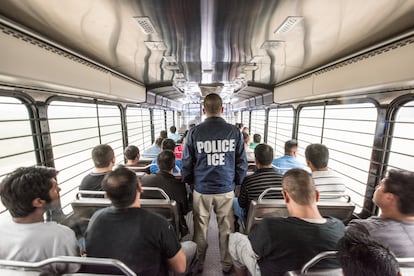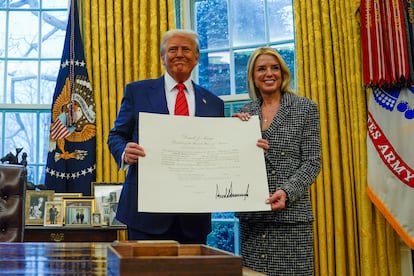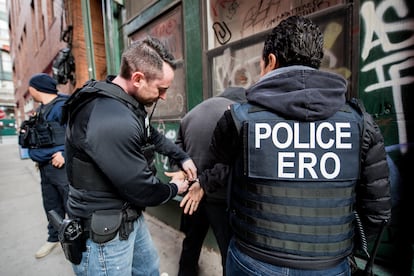Donald Trump launches open war against sanctuary cities
The Justice Department’s lawsuit against Chicago and Illinois, along with a House investigation, cap months of threats directed at jurisdictions with laws that limit local cooperation with federal immigration authorities


Since the presidential campaign, Trump has portrayed Chicago as a city plagued by crime, a lawless pit, and even a war zone. He has held it up as the prime example of the chaos and misgovernance supposedly caused by its status as a sanctuary city, which prevents law enforcement from collaborating with immigration authorities to identify, detain, and deport undocumented immigrants. Trump vowed that Chicago would be the starting point for dismantling such jurisdictions that restrict cooperation with Immigration and Customs Enforcement (ICE) — a promise he has since acted upon. His administration has launched multiple initiatives, including a lawsuit against Chicago and Illinois, as well as a congressional investigation into several sanctuary cities.
The roadmap had already been laid out. The administration’s strategy to target these jurisdictions — considered safe havens for undocumented immigrants Trump seeks to deport en masse — focused on two main fronts: economic and legal.
On one front, the administration has repeatedly threatened to withhold federal funding from localities with sanctuary laws, ranging from counties to entire states. On the other, it argues that these laws or ordinances are unconstitutional, as they obstruct the enforcement of national immigration laws, which fall under exclusive federal jurisdiction.
The threatening language in a letter sent in late December to 249 jurisdictions nationwide made the administration’s intent clear: to pressure sanctuary cities into compliance through fear of economic and legal repercussions. However, the unwavering commitment of many localities to their existing policies and their refusal to cooperate with Trump’s mass deportation agenda have forced the administration to escalate its actions.

On Wednesday, on her first full day in office, Trump’s new Attorney General Pam Bondi directed her officials to identify local governments with policies that hinder immigration enforcement and to take action “where appropriate.” She also indicated that her department would withhold funding from sanctuary jurisdictions, though the specific funds in question are relatively small.
On Thursday, Bondi announced a lawsuit against several officials in Illinois and its capital, Chicago. Among those accused of obstructing federal immigration enforcement are Governor J.B. Pritzker and Mayor Brandon Johnson, both of whom have emerged as leading figures in the national opposition to Donald Trump.
The Justice Department cites several state and local regulations — including the Illinois Trust Act, the Way Forward Act, and Chicago’s Welcoming City Ordinance — arguing that they are “designed to and in fact interfere with and discriminate against the Federal Government’s enforcement of federal immigration law” in violation of the Supremacy Clause of the U.S. Constitution, which establishes that federal law takes precedence over state law.
In a statement in response to the lawsuit, Governor Pritzker said: “Unlike Donald Trump, Illinois follows the law. The bipartisan Illinois TRUST Act, signed into law by a Republican governor, has always been compliant with federal law and still is today. Illinois will defend our laws that prioritize police resources for fighting crime while enabling state law enforcement to assist with arresting violent criminals.”
Another front in the battle against sanctuary cities has emerged in Congress. House Oversight and Government Reform Committee Chairman James Comer announced an investigation into sanctuary policies last week. This week, he confirmed that the mayors of Chicago, Boston, Denver, and New York have agreed to testify at a committee hearing scheduled for March 5.
“Sanctuary mayors owe the American people an explanation for city policies that jeopardize public safety and violate federal immigration law by releasing dangerous criminal illegal aliens back onto the streets,” said Comer. “These reckless policies in Democrat-run cities and states across our nation have led to too many preventable tragedies. They also endanger ICE agents who are forced to take more difficult enforcement actions in jurisdictions that refuse to cooperate with federal immigration authorities [...] “The policies in Boston, Chicago, Denver, and New York City prioritize criminal illegal aliens over the American people. This is unacceptable and their leaders must be held accountable. We will press these mayors for answers and examine measures to enforce compliance with federal immigration law.”
For now, leaders of sanctuary jurisdictions have stood firm, with one notable exception: New York Mayor Eric Adams. Unlike his counterparts, Adams has signaled a willingness to cooperate with the Trump administration, including repealing the rule that requires the city not to collaborate with the federal immigration agency, and to provide refuge to migrants.
Elsewhere, however, Democratic-led states— from California to Massachusetts — have reaffirmed their commitment to sanctuary policies, refusing to assist the Trump administration on immigration matters or participate in the ICE raids that have been ongoing since the first week of Trump’s second term. Their reasoning is both ethical and practical: beyond upholding values of dignity and human rights for migrants, sanctuary laws are seen as essential for fostering trust between immigrant communities and law enforcement, ensuring that residents feel safe reporting crimes.

But under Trump, there is no effective counterargument to the claim that sanctuary laws are unconstitutional or that they systematically shield criminals. Moreover, there are no signs that the rhetoric against them will soften — on the contrary, it has only intensified. The current offensive against sanctuary cities is a continuation of policies from Trump’s first administration. During those years, his administration attempted to withhold federal funding from these jurisdictions, but they fought back in court — and won.
Since then, Trump’s team has learned from its past setbacks and developed new legal arguments. They also benefit from a strengthened institutional apparatus, most notably an ultra-conservative Supreme Court, with three of its six majority justices appointed by him. In any future hearings or trials on this issue, this reality will loom large: if the conflict escalates to its bitter end, the court that delivers the final verdict is more likely to align with the Trump administration’s position.
Sign up for our weekly newsletter to get more English-language news coverage from EL PAÍS USA Edition
Tu suscripción se está usando en otro dispositivo
¿Quieres añadir otro usuario a tu suscripción?
Si continúas leyendo en este dispositivo, no se podrá leer en el otro.
FlechaTu suscripción se está usando en otro dispositivo y solo puedes acceder a EL PAÍS desde un dispositivo a la vez.
Si quieres compartir tu cuenta, cambia tu suscripción a la modalidad Premium, así podrás añadir otro usuario. Cada uno accederá con su propia cuenta de email, lo que os permitirá personalizar vuestra experiencia en EL PAÍS.
¿Tienes una suscripción de empresa? Accede aquí para contratar más cuentas.
En el caso de no saber quién está usando tu cuenta, te recomendamos cambiar tu contraseña aquí.
Si decides continuar compartiendo tu cuenta, este mensaje se mostrará en tu dispositivo y en el de la otra persona que está usando tu cuenta de forma indefinida, afectando a tu experiencia de lectura. Puedes consultar aquí los términos y condiciones de la suscripción digital.








































